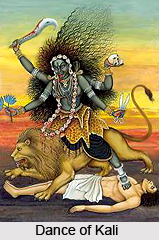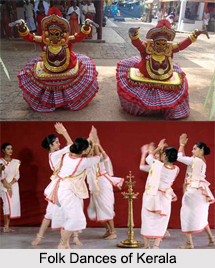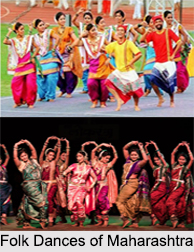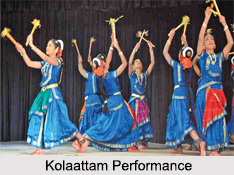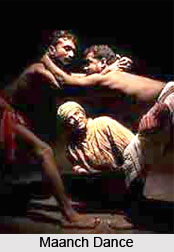 Maanch is a lyrical folk drama and a form of operatic ballet that is very popular in Malwa region of Madhya Pradesh.Maanch has its beginning in the 17th century.It is believed that Guru Balmokand, who died quiet an early age, started modern Maanch, during a performance of Genda Pari ("The fairy of the Marigold Flower"). The language of the Maanch is traditionally Malwi, although, now Hindi is also being used in its performance. "Maanch" means the stage or place of performance and as an indigenous & distinct folk-form.
Maanch is a lyrical folk drama and a form of operatic ballet that is very popular in Malwa region of Madhya Pradesh.Maanch has its beginning in the 17th century.It is believed that Guru Balmokand, who died quiet an early age, started modern Maanch, during a performance of Genda Pari ("The fairy of the Marigold Flower"). The language of the Maanch is traditionally Malwi, although, now Hindi is also being used in its performance. "Maanch" means the stage or place of performance and as an indigenous & distinct folk-form.
Maanch is performed in open space with barest of theatrical equipments, where the stage has a round shape and is never covered from any side; nor is a curtain used as a background. The stage is prepared from wooden poles and is used to provide the platform at a height of five to six feet or even more from the ground. The length of the stage is generally thirty feet while the width is about twenty feet. Generally, most actors in Maanch are from artisan classes like Goldsmiths, Tailors, Carpenters, Gardeners, and Coppersmiths. Only men can participate in this though there was one exemption has been eccentric woman, Babajan, who appeared in heroic roles, about 20 years ago and she had worn a turban and a loose-sleeved shirt.
Rarely, a place is reserved near to the stage for old veterans, which is actually a seat for an expert or experienced persons. On both sides of the stage, the seats are provided for organizers and workers and the Guru sits on the stage itself. Provision for instrumentalists are made on the left side corner of the platform. The person who joins the singing of the refrain during the performance also sits near the `Bara Ghant Ka Pat` or else gets a place near the instrumentalists on the stage. A different type of stage was also popular in Malwa in which instrumentalists used to sit on a separate platform at a considerable height. The acting platform used to be quite lower position than this platform and both the platforms are connected to each other.
The actual performance of the Maanch opens late in the evening with an invocation of gods and goddesses. Then a tribute to the founder of the Maanch mandal (group) and the scriptwriter of the drama is sung. This is followed by verses in praise of Saraswati, Lord Ganesh, Bherun and the Chousath Yogini, which is sung by the entire cast on the stage, with folded hands.
Then the Chopdar comes on stage, where he calls upon the Bhisti (water carrier) to sprinkle water on the ground. The Chopdar plays an important role at the beginning of the actual play, since he invites the performers on the stage and introduces them to the audience, after which, he even introduces the theme of the drama and sets the mood for the same. The Farrasan, who is supposed to spread a carpet, follows him and then the stage becomes ready for performance after this. Both the Bhisti and the Farrasan run on their performance, which also contains mime & singing of several songs for more than an hour.
The dialogues in the Maanch always end with the refrain line, which is sung by the performers standing together either in the corner of the stage or arranging themselves near the instrumentalists, where the dholak plays a vital part in providing the musical background. The dholak is played with its own style and forms the base of typical folk music of the region. Even the sarangi is also used to give orchestral effects. The whole orchestra repeats the dramatic verse and enables the actor to dance in circles at the conclusion of each couplet.
The presentation style & technique of the Maanch, its various thematic elements, & suitable music and gaudy costumes all contribute in making this play a unique one. All of this is followed by a rich tradition. Actors are absolutely free to move in any direction at the time of performance. There are no rigid rules to follow and stage formalities to worry. They sometimes even sit amongst the audience when there is no stage work. However, sometimes, the characters do not leave the platform for the whole play and they just move at the back and front for their turn. There are also cases, when the certain characters make their entry from a distance walking through the audience.

